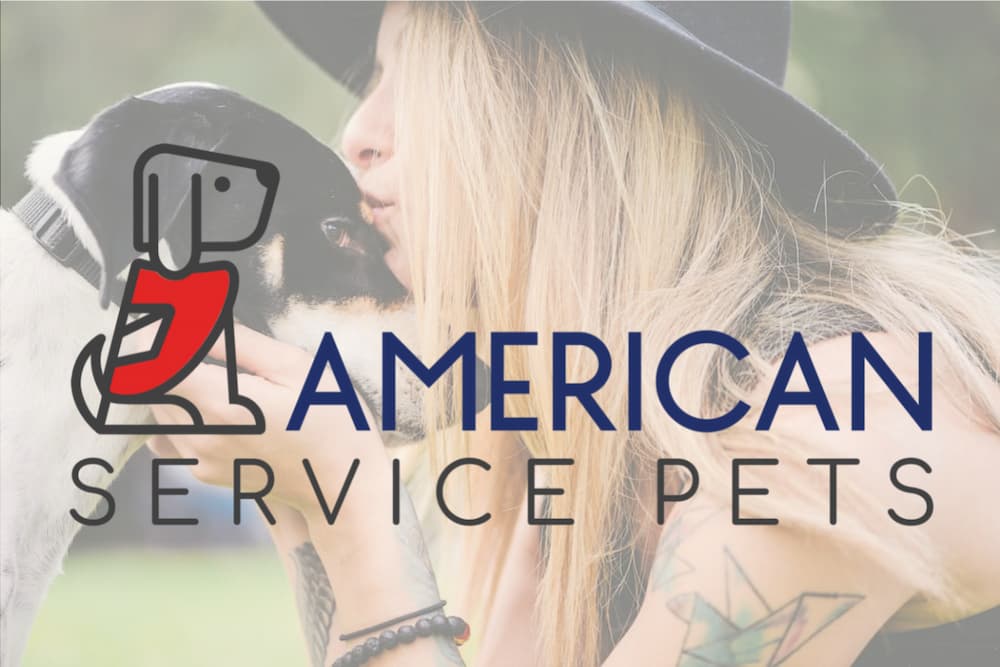How to Get Your Emotional Support Animal Certification
in Nebraska

Countless Americans who are coping with the warning signs of emotional disorders find the comfort and support of their pets indispensable. Medical conditions such as PTSD, depression, panic, and anxiety can suddenly make the things you do every day challenging. Social situations become unbearable without the assistance of their Emotional Support Animal (ESA).
United States laws protect the rights of those who own these animals in certain circumstances, but landlords and others aren’t always supportive. Landlords can legally evict tenants without proper documentation for their comfort animals, but they can face severe and costly consequences if they don’t follow the Emotional Support Animal laws.
American Service Pets helps tenants get the approval they need for an ESA. Never pay a pet deposit again. Qualify for your animal with a Nebraska ESA letter now.
3 Key Benefits of Emotional Support Animals
An ESA is a documented healing animal, usually a dog, that helps its handler manage the stressful parts of their day. Laws in the United States safeguard the rights of people living with mental impairments to keep their Emotional Support Animal in their rental home.
State and federal laws acknowledge the need for these uniquely helpful animals and the advantages they deliver, including:
Improve Mood
Support animals make you feel happy because the interaction increases levels of serotonin and dopamine, the body’s natural mood enhancers. These companions welcome you home with enthusiasm and are always delighted to be with you, and that can often boost your mood.
Natural Medicine
The health benefits of having an animal in your life are similar to prescription antidepressant medications but without the accompanying risks. Emotional Support Animals are natural treatments for numerous symptoms of emotional disorders. They also provide a physical health benefit by promoting outdoor play and activity.
Authentic Comfort
Panic attacks can happen at any moment. Anxiety attacks can go on all day. The effects of emotional trauma can last for years. ESAs can help their handlers in such vulnerable times by bringing a grin, laughter, and cheerful feelings to those in their lives.
Emotional disorders can make some aspects of life tough for people to navigate without the support of their ESA. American Service Pets provides a fast and easy way for pet owners to get approved in just a few minutes for their emotional support animal in Nebraska. Take the test to see if you qualify for an ESA letter in Nebraska now.
Nebraska Emotional Support Animal Laws
Nebraska state law accepts the mental health rewards of these special animals, even when they aren’t specifically trained. An ESA can provide emotional support and fellowship, unlike official Psychiatric Service Animals, which are taught to implement lifesaving duties and specialized tasks to accommodate disabled citizens. Psychiatric Service Animals and ESAs perform different jobs and are provided separate privileges under the law.
Only Emotional Support Animals with an authentic ESA letter enjoy legal privileges in Nebraska. Official letters are accepted nationwide, but states have varying rules. It’s a smart idea to research before traveling or relocating to familiarize yourself with the rights of ESA handlers in that state. Here’s a summary of the major points in Nebraska:
Housing Laws
Landlords can’t turn Nebraska tenants away for rental housing, charge them a pet deposit, or evict them for owning an ESA. Landlords may legally ask to see a tenant’s ESA letter but cannot demand proof of a mental diagnosis. They can still turn away an Emotional Support Animal for rental housing if it poses a safety risk or health concerns. Examples are if the animal is very large or not house-broken.


Public Places
Access to public establishments is not a guaranteed right for ESAs in Nebraska. Malls, shopping centers, grocery stores, parks, beaches, restaurants, and other public places are under no legal liability to allow them access. Laws are different for Psychiatric Service Animals, or PSAs, however. They are formally trained animals that assist psychiatric patients with symptoms such as sensory perception issues.
Workplace Laws
The Americans with Disabilities Act (ADA) endorses the rights of the disabled to bring their PSA to their workplace. Nebraska law doesn’t afford Emotional Support Animals the same rights, however. Getting an ESA letter could be what it takes to convince a sympathetic employer, though.


Travel Laws
The Air Carrier Access Act supported comfort animals in a plane’s cabin with their owner until 2020, when their policies changed. Only official PSAs are permitted to ride in the cabin, free of charge. Support animals are not promised access to public transportation in Nebraska, including buses, trains, subways, and ride-share services.
American Service Pets is honored to offer an easy three-step process to provide ESA letters to Nebraska residents.
FAQ
The Basics
Yes, Nebraska has its own civil rights laws in addition to complying with the federal Americans with Disabilities Act (ADA).
A service animal is an animal that has been individually trained to do work or perform tasks for an individual with a disability. The task(s) performed by the aimal must be directly related to the person’s disability. Nebraska law specifically categorizes animals that aid with physical disabilities (ie. guide dogs for the blind, signal/hearing dogs, etc.) as service animals, but the ADA covers service animals for both physical and mental disabilities.
Nebraska defers to the ADA’s definition for “disability,” which says that a disability is a “physical or mental impairment which substantially limits one or more major life activities” of an individual.
Only dogs (and in some cases miniature horses) are eligible to be service animals under Nebraska and ADA law.
Yes. It is considered a Class III misdemeanor in Nebraska to unlawfully use a guide dog.
If an individual is a service dog trainer, they may be accompanied by the animal while training in public spaces without being required to pay additional charges for the animal.
Emotional support, therapy, comfort, or companion animals do not qualify for the same protections that service animals do because of the fact that they are untrained.
FAQ
Public Accommodations & Travel with a Service Animal
Under Nebraska law, service animals are allowed in all hotels and other lodging places; all places of public amusement, resort, or accommodation; all common carriers, types of transportation and public conveyances; and all places to which the public is invited. The ADA’s definition of public accommodation is equally as broad.
The only questions a public establishment can ask are whether or not the animal in question is a service animal and what task(s) it is trained to perform.
Religious organizations and private clubs are not considered public accommodations under the ADA (unless a private club makes its facilities available to nonmembers). Service animals may be removed from or denied access to facilities that are considered public accommodations if the animal is not housebroken, is out of control, or presents an immediate threat to those around it.
Nebraska law allows for service animals on “all common carriers, types of transporationa, and public conveyances.” This includes buses, taxis, trains, and boats.
You may choose to license your service animal through the Nebraska Humane Society. Some counties in the state require licensing for all animals, regardless of pet or service animal status, but only dogs may be licensed as service animals. In areas where animal licensing is required, service animals qualify for free licensing.
Service animals are covered under reasonable accommodations in the workplace. An employee or job applicant can request use of their service animal as an accommodation. However, accommodation requests can be rejected if they would cause undue hardship for the business.
Generally, service animals are allowed in areas like hospital patient rooms where the general public and patients would be allowed. They may be barred from sterile areas like operating rooms or burn units. Service animals are also allowed to ride in ambulances with their handlers if their presence will not interfere with the medical professionals’ ability to treat the handler. If that is the case, the hospital staff must arrange for the animal to be transported to the hospital.
Any person or business who interferes with a service animal or disabled individual and their access to public accommodations is guilty of a Class III misdemeanor under Nebraska law.
Nebraska follows the Air Carrier Access Act (ACAA), which defines a service animal as a dog (regardless of breed or size) trained to do work or perform tasks to assist a qualified individual with a diability, and may include psychiatric service dogs. Minature horses are excluded in this definition.
Airlines can require a passenger to provide a U.S. Department of Transportation (DOT) form attesting to the animal’s health, behavior, and training and a U.S. DOT form attesting that the animal can either not relieve itself or can relieve itself in a sanitary manner (if the animal will be on a flight that is 8 or more hours).
The ACAA does not address service animals in-training, so airlines are not required to carry them as they do not meet the requirements of an ACAA-defined service animal. However, airlines can make their own individual policies.
FAQ
Housing Law
Nebraska law specifically covers service animals for visual or hearing impairment in housing, and the Federal Fair Housing Act (FHA) steps in to cover all categories of service animals, whether for physical or mental disabilities. Disabled individuals with service animals must be allowed full and equal access to housing facilities without having to pay extra “pet rent.”
Yes, you may be liable for any damage caused by your service animal or ESA.
The FHA extends housing protections to ESAs as well, but tenants must still request reasonable accommodations for their animals.
FAQ
Discrimination Complaints
Filing complaints for discriminatory incidents can be done through the Nebraska Equal Opportunity Commission (NEOC). Complaints about employment discrimination should be made within 300 days and complaints about public accommodation discrimination should be made within 10 days from the date of harm. You can also get in touch with Disability Rights Nebraska by calling 402-413-2016 or filling out their online intake form. Depending on your situation, an advocate may be able to help.
If you believe you have experienced housing discrimination in Nebraska, you have grounds to file a discrimination complaint under the Nebraska Fair Housing Act. Complaints can be filed through the Nebraska Equal Opportunity Commission (NEOC) online, by calling a regional office, or going to a regional office in person. You must file the housing complaint within 1 year of the alleged discrimination.
How to Get an ESA Letter Through American Service Pets
American Service Pets offers a simple process to get your pet approved as an Emotional Support Animal. It involves only three quick steps:
Fill Out the Questionnaire
It takes approximately three to five minutes to answer the American Service Pets questionnaire to determine your eligibility for approval.
Get a Doctor’s Approval
American Service Pets allows you to submit your file to a licensed Nebraska state-approved doctor or other licensed mental health provider for authorization. Doctors are always available, and they approve most requests within three to five minutes. Official letters are delivered immediately via email.
Add Your Pet to the National Directory
We add your pet to the national directory to get a convenient online pet profile that shows your pet’s status and ESA letter for public view anytime it’s needed.
Get approved for your support animal today. American Service Pets accepts approximately 95% of applicants in an hour or less.
The American Service Pets Advantage
More than 45,000 ESA owners have gained validation for the status of their Emotional Support Animals with American Service Pets. Here’s what makes us a great option:
- Access to a Nebraska medical professional
- Free qualification process
- No prescription required
- All-in-one solution to support animal approval issues

Answer the simple questions to get your special pet approved as an ESA today with American Service Pets. We are committed to helping people with emotional disorders receive the therapeutic rewards of an Emotional Support Animal.
Experts in Nationwide Support Animal Approval
Approval to own a Nebraska Emotional Support Animal is the solution to rental housing problems and sometimes other issues when you’re denied access to your companion. American Service Pets helps pet owners get the help they need for their ESA.
Take our test today for approval in less than half an hour.
Disclaimer: We would like to emphasize that while the terms “certification” or “registration” may be used in relation to Emotional Support Animals, there is no official certification process for ESAs or any form of ESA registry as of this date. As such, the use of these terms should not be interpreted as legally recognized designations by government or regulatory authorities. Remember, ESAs can provide a valuable source of comfort and support, but their recognition relies on proper documentation from a healthcare professional and adherence to relevant laws and guidelines.

